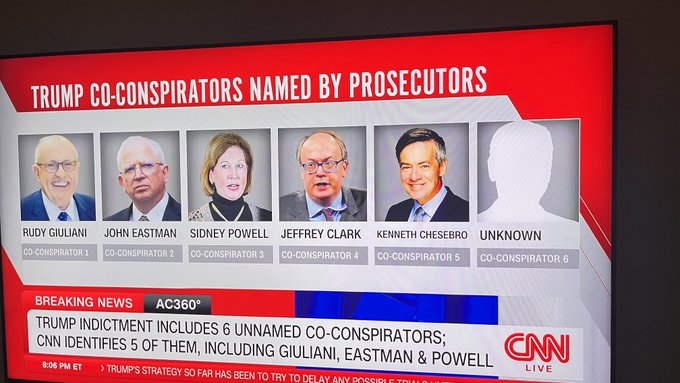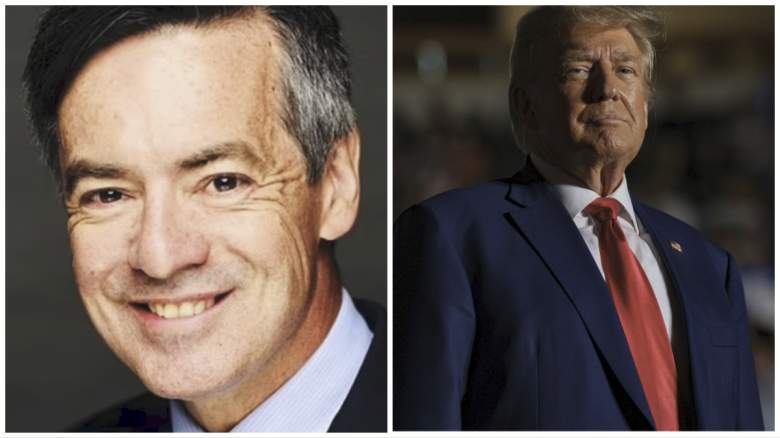
Kenneth Chesebro is an appellate lawyer from Austin, Texas, who is one of the six unindicted people accused of being “co-conspirators” in the latest Trump indictment.
His LinkedIn page says he has worked as a litigation attorney, primarily at the appellate level and usually with “plaintiffs’ attorneys on cases against corporate defendants.”
Five of the six people accused of being “co-conspirators” in the indictment accusing Trump of crimes for his actions relating to the 2020 presidential election are attorneys. According to the Independent, Chesebro was accused by the House January 6 Committee of “being the architect of the fake elector plot” in seven states. The indictment accuses him of authoring memos that outlined the fake elector scheme.
READ NEXT: Jack Smith’s Wife, Katy Chevigny
Here’s what you need to know:
1. Kenneth Chesebro Has Been Identified as Alleged ‘Co-Conspirator 5’ in the New Trump Indictment
The indictment says the following of alleged Co-Conspirator 5: “An attorney who assisted in devising and attempting to implement a plan to submit fraudulent slates of presidential electors to obstruct the certification proceeding.” This person is identified in previous reporting as attorney Kenneth Chesebro.
The indictment accuses Trump and “co-conspirators” including Chesebro of developing a new plan “to marshal individuals who would have served as the Defendant’s electors had he won the popular vote in seven targeted states – Arizona, Georgia, Michigan, Nevada, New Mexico, Pennsylvania and Wisconsin – and cause those individuals to make and send to the Vice President and Congress false certifications that they were legitimate electors.”
The plan “capitalized on ideas presented in memoranda drafted by Co-Conspirator 5, an attorney who was assisting the Defendant’s Campaign with legal efforts related to a recount in Wisconsin,” the indictment says.
“The memoranda evolved over time from a legal strategy to preserve the Defendant’s rights to a corrupt plan to subvert the federal government function by stopping Biden electors’ votes from being counted and certified,” the indictment says.
The memo, called the “Wisconsin Memo,” advocated that because of an ongoing recount in Wisconsin, Trump’s “electors there should meet and cast votes on December 14 – the date the ECA required appointed electors to vote – to preserve the alternative of the Defendant’s Wisconsin elector slate in the event the Defendant ultimately prevailed in the state,” the indictment says.
A second memo called the “Fraudulent Elector Memo” in the indictment advocated that “the alternate electors originally conceived of to preserve rights in Wisconsin instead be used in a number of states as fradulent electors to prevent Biden from receiving the 270 electoral votes necessary to secure the presidency on January 6,” the indictment says.
The fake electors should “meet and mimic as best as possible the actions of the legitimate Biden electors,” according to the indictment.
A third memo “consisted of Co-Conspirator 5’s instructions on how fraudulent electors could mimic legitimate electors in Arizona, Georgia, Michigan, Nevada, Pennsylvania and Wisconsin,” the indictment says.
It accuses Co-Conspirator 5 of noting that “in some states it would be virtually impossible for the fraudulent electors to successfully take the same steps as the legitimate electors because state law required formal participation in the process by state officials or access to official resources.”
The indictment says Chesebro called an Arizona attorney, who says his idea was that the states “have our electors send in their votes (even though the votes aren’t legal under federal law – because they’re not signed by the governor) so that members of Congress can fight about whether they should be counted on January 6 . . . Kind of wild-creative. I’m happy to discuss. My comment to him was that I guess there’s no harm in it (legally at least) . . .”
The indictment also accuses Chesebro of being involved in discussions relating to Pennsylvania.
Chesebro is accused of sending an email that “further confirmed that the conspirators’ plan was not to use the fraudulent electors only in the circumstance that the Defendant’s litigation was successful in one of the targeted states – instead the plan was to falsely present the fraudulent slates as an alternative to the legitimate slate,” the indictment says.
Chesebro drafted and sent fraudulent elector certificates in New Mexico, according to the indictment.
Politico reported in 2022 that Chesebro was a lawyer “who helped develop former President Donald Trump’s last-ditch strategy to subvert the 2020 election” and said he moved “to block a subpoena for his testimony to an Atlanta-area grand jury investigating potential crimes connected to the effort.”
2. Ken Chesebro, Deputy Special Counsel in the Iran-Contra Investigation, Says He Has Handled More than 100 Cases in the U.S. Supreme Court & Lower Courts
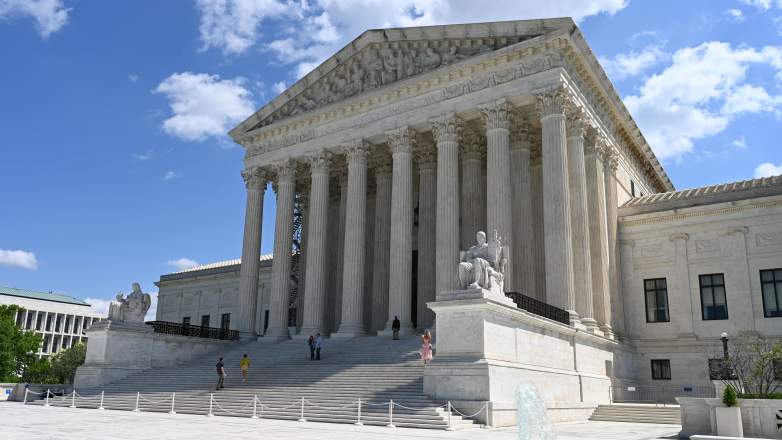
Daniel Slim/AFP via GettyThe US Supreme Court is seen in Washington, DC, on April 23, 2023.
Chesebro’s LinkedIn page says he served as “deputy special counsel for the Office of the Independent Counsel for Iran/Contra matters” for the U.S. Department of Justice in Washington D.C. in 1993. He also served as a law clerk for Judge Gerard A. Gesell and was a summer associate for New York and Chicago law firms in the 1980s, according to his LinkedIn page.
According to his LinkedIn page, Ken Chesebro “has handled more than 100 cases in the U.S. Supreme Court and lower courts, frequently on behalf of trial lawyers pursuing high-profile litigation against corporations.”
The post continues:
He was lead counsel for the plaintiffs in the landmark 1993 Daubert case which clarified the rules for admission of expert testimony. He was also lead counsel for the plaintiffs in the 1993 TXO case, the last case in which the U.S. Supreme Court upheld a punitive damages award in full after reviewing its constitutionality on the merits (sustaining a $10 million punitive damages award that was 526 times the compensatory damages award). He has handled many other cases involving expert testimony and punitive damages, and has successfully defended on post-trial review and/or on appeal many sizable damages awards, including one of the largest awards ever upheld against a tobacco defendant (the $55 million award upheld by the California appellate courts in 2005 in Boeken v. Philip Morris).
Although Chesebro focuses principally on representing plaintiffs against corporations, he is an appellate generalist who has handled a wide range of other appellate matters, frequently involving constitutional law issues. He has twice been retained by Members of Congress to represent them on constitutional matters in the U.S. Supreme Court; he represented the attorneys general of 21 States in defending the due process right of Vietnam veterans to sue the chemical companies that manufactured Agent Orange; he served as Deputy Special Counsel in the Iran/Contra investigation; and he has served as a lecturer at workshops held by the Federal Judicial Center to provide guidance to federal judges on expert testimony.
3. Kenneth Chesebro, a Wisconsin Native, Graduated From Harvard Law School
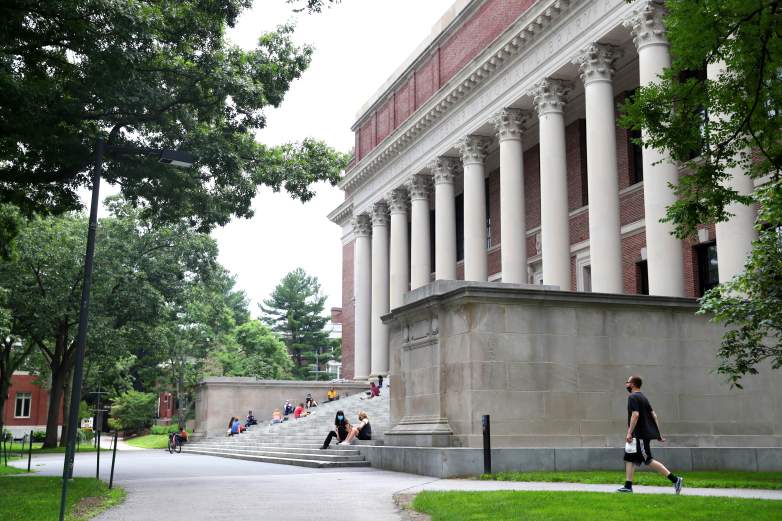
GettyA view of Harvard Yard on the campus of Harvard University on July 08, 2020 in Cambridge, Massachusetts.
According to his LinkedIn page, Chesebro is a Wisconsin native “who graduated from Northwestern University (B.S. 1983) and Harvard Law School (J.D. 1986), where he was an editor of the Law Review.”
Kenneth Chesebro is named in a lawsuit in Wisconsin that was brought by Democrats against “Wisconsin Republicans who posed as electors in 2020,” Urban Milwaukee reported.
The Democrats argued that “the 10 Republicans and two attorneys who advised them broke a variety of laws, including one that bans people from falsely acting as public officials. Plaintiffs are seeking punitive damages of up to $2.4 million,” the Wisconsin-based news site reported.
4. Kenneth Chesebro’s Lawyer Told the January 6 Committee That He Was Vilified & in “a Tremendous Amount of Jeopardy for Someone Who Was Simply Doing His Job as a Lawyer’
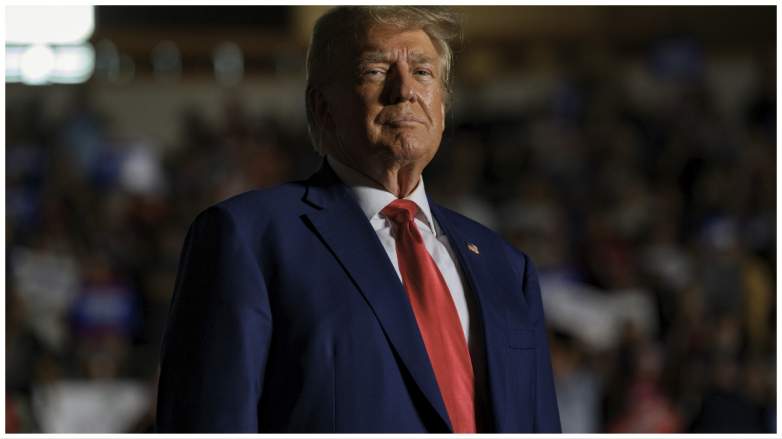
GettyPresident Donald Trump.
Chesebro gave a deposition to the U.S. House January 6 committee.
His lawyer, Adam Kaufmann, told the committee that Chesebro “is faced with a tremendous amount of jeopardy for someone who was simply doing his job as a lawyer. There are the two grand jury investigations ongoing in Fulton County, Georgia, and by the Department of Justice. And equally, Mr. Chesebro finds himself being vilified in the press, and there are 18 submissions to Bar committees suggesting that he be forced out from the Bar.”
As a result, Kaufmann told the committee that Chesebro was advised to “invoke his Fifth Amendment protections” at times. He testified that his work for Trump involved the Wisconsin recount. Chesebro declined to answer multiple questions.
He was asked, “Were you, Mr. Chesebro, consulted in any way with respect to calls or meetings with State and local officials about the 2020 election? And specifically, those calls or meetings would involve people from the Trump 10 campaign or Mr. Trump himself.” He answered that the “answer is no, I had no communications regarding any of that.”
Daily Mail reported that Chesebro “devised a plan for Vice President Mike Pence to recuse himself from presiding over the certification of electoral college votes on January 6 last year so that a senior Senate Republican could refuse to count votes from states won by Joe Biden,” per an email.
5. Kenneth Chesebro Has Used Puerto Rico as an Address & Is Divorced, Reports Say
According to the site Cambridge Day, Chesebro has “worked as an attorney in New York, Massachusetts and California,” and his LinkedIn previously listed him as currently working in San Juan, Puerto Rico.
“He also had a home at 1600 Massachusetts Ave., above the Harvard University Physics Research Library, that was conveyed to his wife in a divorce. For a time, he lived in a Ritz-Carlton Condo in Boston for a time, according to a title search,” the site reported.
The Florida Bar lists his address as being in Puerto Rico but says he is not authorized to practice law in Florida.
READ NEXT: Jack Smith’s Wife, Katy Chevigny

